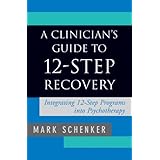
Average Reviews:

(More customer reviews)Are you looking to buy A Clinician's Guide to 12-Step Recovery: Integrating 12-Step Programs into Psychotherapy? Here is the right place to find the great deals. we can offer discounts of up to 90% on A Clinician's Guide to 12-Step Recovery: Integrating 12-Step Programs into Psychotherapy. Check out the link below:
>> Click Here to See Compare Prices and Get the Best Offers
A Clinician's Guide to 12-Step Recovery: Integrating 12-Step Programs into Psychotherapy ReviewFrom John Howard Prin, author of The Roadmap to Lifelong Recovery and Secret Keeping: Overcoming Hidden Habits and AddictionsAs an experienced counselor who helps people trapped in stubborn addictions, I am grateful for the ways this book opened my eyes to numerous insights and useful concepts. The author, Mark Schenker, PhD, carefully lays out in plain language the many ways that psychology and the 12 Steps could work together -- but so seldom have, due to prejudice, misinformation, and stereotypes.
Dr. Schenker makes the case that mental health professionals who still refuse to learn about or use the 12-Step approach with alcoholic or drug-addicted clients are rejecting a powerful tool set. Both approaches, professional psychotherapy and peer-based 12 Steps (AA, NA, Al-Anon meetings, etc.), have much to offer the suffering individual as well as the families and friends who suffer with them.
One of the main points of contention between these differing approaches is the central role of spirituality embedded in the 12-Step model. Dr. Schenker has clearly spelled out the ways the 12 Steps can open up the possibility of profound personal transformation. Stable sobriety involves more than saying no to alcohol or drugs; it means saying yes to significant changes in self-concept, thinking, lifestyle, and values. This transformation is the true reward of life changes based on sound spiritual development. For many, the spiritual dimension becomes a vital avenue to healing, serenity, acceptance, and the daily experience of an inner world that is more peaceful and an outer world that reflects fewer struggles.
Support for these points derives from the author's meticulous exploration of the research of pioneering figures such as William James, Carl Jung, Ernest Kurtz, Gregory Bateson, Harry Tiebout, Bill Wilson (author of the AA Big Book), and certain Zen masters.
The author's main contribution? Bringing to light the numerous strengths and advantages of 12 Step recovery for lay persons and professionals alike, especially his encouraging words for psychotherapists whose attitudes and skills with addictive clients can be enhanced. As someone who uses both approaches daily with my clients -- Positive Psychology and Cognitive Behavioral Therapy, for example, along with 12-Step principles and group methods -- I am privileged to observe the powerful results of this marvelous combination of healing. My hope is that more people will become aware of how both approaches improve the lives of recovering individuals.
A Clinician's Guide to 12-Step Recovery: Integrating 12-Step Programs into Psychotherapy Overview
Want to learn more information about A Clinician's Guide to 12-Step Recovery: Integrating 12-Step Programs into Psychotherapy?
>> Click Here to See All Customer Reviews & Ratings Now
0 comments:
Post a Comment